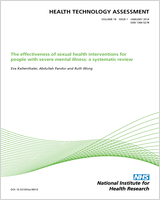NCBI Bookshelf. A service of the National Library of Medicine, National Institutes of Health.
Hughes E, Mitchell N, Gascoyne S, et al. Sexual health promotion in people with severe mental illness: the RESPECT feasibility RCT. Southampton (UK): NIHR Journals Library; 2019 Dec. (Health Technology Assessment, No. 23.65.)

Sexual health promotion in people with severe mental illness: the RESPECT feasibility RCT.
Show detailsA team of researchers, mental health and sexual health workers, and people with lived experience of mental health problems developed an intervention to help people with serious mental health problems to increase their knowledge and understanding of sexual health, including types of contraception, using condoms safely and sexually transmitted infections, and to consider safety and assertiveness in intimate relationships. This was delivered over three sessions of 1 hour by a specifically trained mental health worker. We recruited 72 people from community mental health services to take part in a study to test the intervention and see whether or not we could collect information about their sexual behaviour using questionnaires.
Initially, the numbers of people volunteering for the study were very small. We found that recruitment increased when we shifted to a more direct approach (rather than asking clinical staff to promote the study to people on their caseloads). The direct approach included talking to people who use services directly in clinics and at service user events, and by sending study information by post. We were not able to recruit the numbers that we aimed to (72/100 participants) in the timescale of the study, but the majority of the people who were recruited actively participated in the trial and were generally happy to attend follow-up appointments to complete more questionnaires. Most of those who were allocated to the intervention attended all three sessions.
Overall, people found that being a participant of the study was comfortable and safe (acceptable) and we found that it was possible to undertake this type of study within mental health services. We have learnt a lot about how we could run this study on a larger scale. Such a study would allow us to see if the intervention makes a difference to sexual behaviour and increases access to sexual health services for people with serious mental illness.
- Plain English summary - Sexual health promotion in people with severe mental ill...Plain English summary - Sexual health promotion in people with severe mental illness: the RESPECT feasibility RCT
- Achenbach Child Behaviour Checklist - Sixteen-week versus standard eight-week pr...Achenbach Child Behaviour Checklist - Sixteen-week versus standard eight-week prednisolone therapy for childhood nephrotic syndrome: the PREDNOS RCT
- Additional meta-analysis results - Coenzyme Q10 to manage chronic heart failure ...Additional meta-analysis results - Coenzyme Q10 to manage chronic heart failure with a reduced ejection fraction: a systematic review and economic evaluation
- Acknowledgements - Carer administration of as-needed subcutaneous medication for...Acknowledgements - Carer administration of as-needed subcutaneous medication for breakthrough symptoms in people dying at home: the CARiAD feasibility RCT
- Methods for the descriptive analysis and systematic review of effectiveness - Ad...Methods for the descriptive analysis and systematic review of effectiveness - Adaptive E-Learning to Improve Dietary Behaviour: A Systematic Review and Cost-Effectiveness Analysis
Your browsing activity is empty.
Activity recording is turned off.
See more...